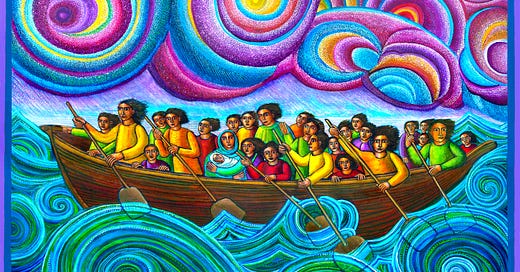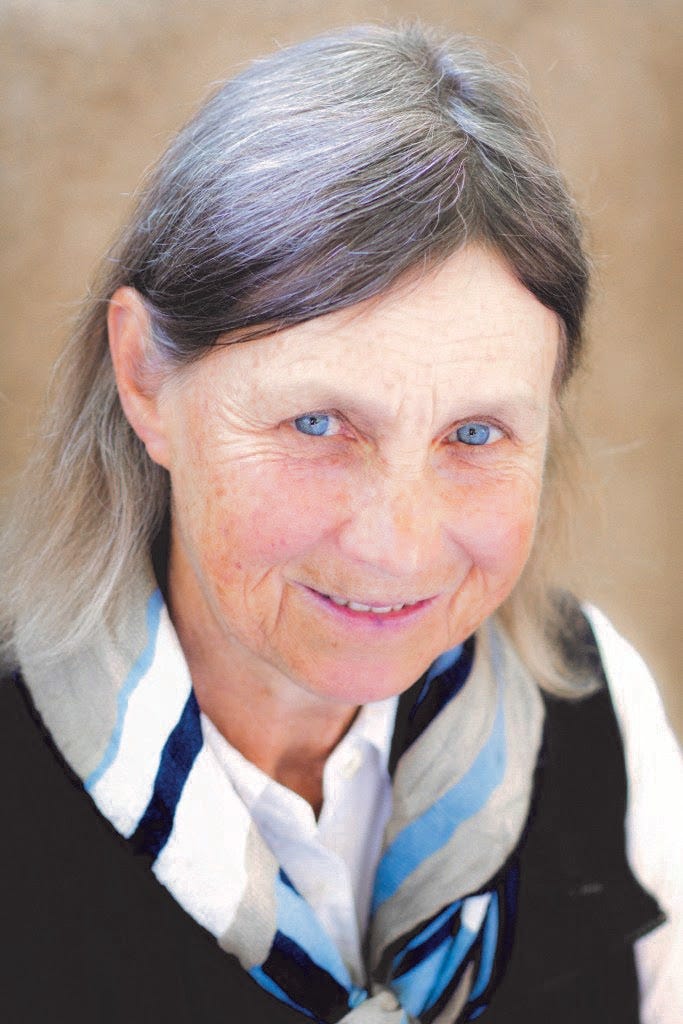My privilege as a church musician
Might we make more space for poets, painters, and actors of faith
Hi everyone,
As a musician, I enjoy a privileged status in the church that needs to be stewarded on behalf of others. Most US churches recognize the value of music enough to pay for it, and so musicians are often some of the best employed people in church. I have been paid to play music for church services for the better part of the last 20 years. During that time, I have served churches of all shapes and sizes - large, small, majority White, Black, Methodist, Congregational, Lutheran, Episcopal, Pentecostal, and non-denominational. And that’s just as a paid musician for service; my ministry through Notes of Rest has expanded that reach.
While I am thankful for such a long personal history of gainful employment, I am aware that this is a privilege. Most other art forms aren’t employed by the church, either at all, or certainly not as often or at the rate of musicians. To be sure, many Black churches hire dance professionals to lead dance ministries, and some churches will pay sculptors or visual artists for one-off pieces. But the number of churches that value those relationships longitudinally is in the minority. What is the place of theater, poetry, literature, visual artists, or even filmmakers in the church? What might happen if we could monetarily value their contributions more?
A fair retort is that perhaps music deserves special status because it is uniquely participatory. There is an energy that comes from singing, shouting, and dancing together that doesn’t come from these other art forms. It is not as kinetically participatory to hear somebody read poetry or view a painted picture. Besides, Scripture discusses music extensively as an especially valued good of God (such as angels rejoicing in the heavens in Revelation 15).
Fair enough. However, the main material form that binds together Christian faith is a piece of literature, the Bible, which is replete with different literary genres, poetry and short story included. And within it, there is robust mention of visual artists responsible for creating the temple and its fixtures. Last, you can certainly read the creation of all that exists in Genesis 1 as the work of the Great Creator. (And God saw that it was good.)
Moreover, up until 500 years ago, visual artists used to be employed in far greater numbers by the church (an insight from my new homie Bruce Hernan, the visual artist I spoke about in last week’s post). But the advent of the Protestant Reformation, with its iconoclastic vendetta against ornate visualizations of God, left most visual artists to starve.
Thankfully there was a silver lining to this cloud. Now that visual artists were not bound to create doctrinal art, they were able to create more aspirational and exploratory art about God and faith. I have gotten that vibe from visual artists as well as poets and writers too. They may love Jesus, and even attend church, but their work often leaves more space for questioning or abstraction than is typically appreciated in church space.

His observation made me wonder: what might our churches look like if more visual artists, poets, dramatists, actors, writers, and even filmmakers were employed?While musicians enjoy frequent employment, our work within church is often in service towards narrow doctrinal aims. I wonder how employing more kinds of artists more routinely might expand everybody’s theological vision. Might it cultivate more patience with God, more compassion towards our neighbor, and more ingenuity in our responses to our own and the world’s crises? What if for church services we hired poets to read regularly, dramatists to create productions beyond (cutesy) Christmas pageants, or sculptors to create newfound creations that provoke and enliven?
And on a broader level, how would US society writ large look different if more dancers, poets, dramatists, and writers could earn living wages at their crafts for whole careers? It’s challenging for most to be an artist in the US, but need it be?
As Western Christendom continues crumbling with factions, apathy, and trauma on the rise, and as genocide, White nationalism, and political malfeasance rage on around the planet, I send out a bat signal to all fellow artists of faith. May the Holy Spirit infuse us with courage, endurance, and creativity to bring new perspectives to our sacred communities. May we find ways to draw people beyond the literal into the metaphorical, such that beauty and justice abound. May we widen the aperture of this country’s imagination so that more know Jesus in fact loves them. May we strive to make much of our talents, for great is the rest of God. Amen.
abundantly,
Julian
What’s Next
Jan 12 Notes of Rest at Dominican University canceled (weather)
Jan 13 Unity Jazz Festival at Jazz at Lincoln Center with Isaiah Collier & the Chosen Few (New York)
Jan 14 Notes of Rest at St. Peter’s Chelsea (New York)
Jan 16 NuBlu with Isaiah Collier & the Chosen Few (New York)
Jan 18 Notes of Rest at Colgate Rochester Crozer Divinity School (Rochester, New York)
Feb 1 Notes of Rest at Olivet Nazarene University (Chicago)
Feb 1 Julian Davis Reid’s Circle of Trust at Hungry Brain (Chicago)
Feb 2-3 Marques Carroll Quintet at Andy’s Jazz Club (Chicago)
Feb 4 Julian Davis Reid’s Circle of Trust at First United Methodist of Oak Park (Chicago)
Feb 11 Notes of Rest at Barrington UMC (Chicago)
Feb 15 Notes of Rest at Saint Leonard’s Ministries (Chicago)
Feb 17 Notes of Rest at Dominican University for Black Students Retreat (Chicago)
Feb 24 Notes of Rest at St. Benedict the African (Chicago)
Feb 25 Isaiah Collier at Winterland Six (Jacksonville)
—
From Closer Than Breath
2024 Centering Prayer Summit - January 20-21, Online
The summit marks a significant milestone, celebrating 40 years of Contemplative Outreach's spiritual work of sharing the gift of Centering Prayer. A two-day journey exploring the depths of Centering Prayer, contemplation, God, and the future of contemplative community, the summit features twenty speakers, including Cynthia Bourgeault and Michael Battle.






Thanks Dom. You’re right. Musicians aren’t paid nearly enough, including me. I wish streaming were more profitable but alas it’s not - yet. I am thankful that I have shows and Notes of Rest sessions to supplement the Pennies made from streaming as well as my day job with Fearless Dialogues.
Sadly, my experience as a Christian musician has been that church people want free music, and think that Christian musicians should NOT ask to be paid. The quality and quantity of music in the church has declined, as a result. Musicians, in general, have been cheated out of the profits from their own work; especially Black musicians, which with even a brief look into the history of music will show. The corporations have stacked the decks against musicians. Streaming makes pennies, even if your music is enjoyed by thousands of people. It's amazing to me, that you have managed to be paid all these years, Julian, but, then again, there is a lot of weight behind a degree from Yale, as opposed to a local non-Ivy league school, like UNH, where I attended.